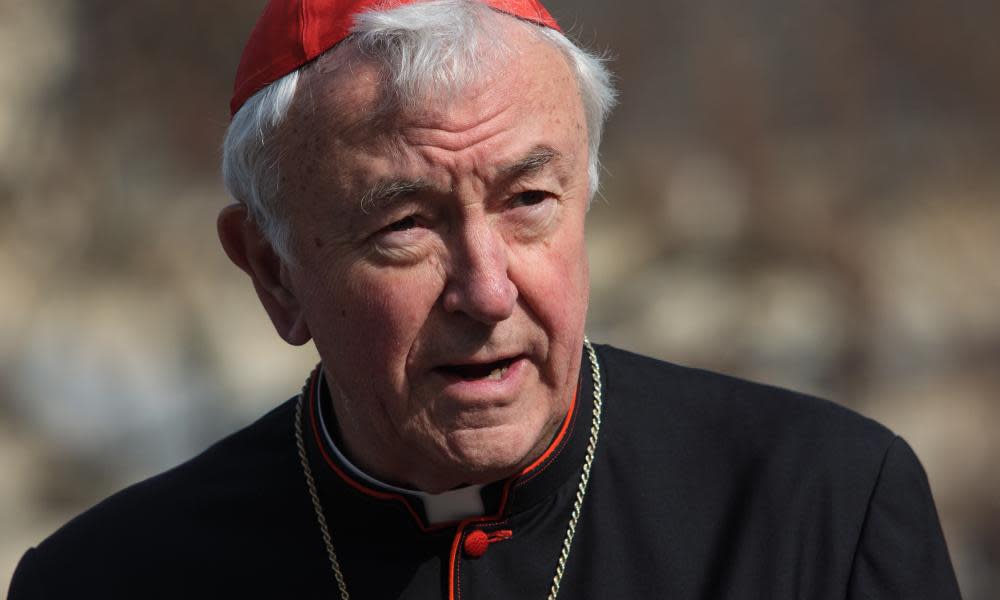Archbishop chose church's reputation above children, inquiry finds

The highest-ranking Catholic leader in England and Wales defended the reputation of the church rather than protecting children in the face of allegations of sexual abuse, a report by the independent sexual abuse inquiry has concluded.
The archbishop of Westminster, Cardinal Vincent Nichols, was heavily criticised in the 65-page report for his inadequate response to sexual abuse claims when he was archbishop of Birmingham from 2002 to 2009.
Nichols “focused too much on the reputation of the church during his tenure, rather than the welfare of children and the impacts of child sexual abuse on victims and survivors,” the independent inquiry into child sexual abuse (IICSA) said. “Children could have been saved from abuse if the church had not been so determined to protect its own reputation above all else.”
Nichols thanked IICSA for its “review of the past” and said his witness statements had addressed all points.
Peter Saunders, a survivor of abuse, said the cardinal “should carefully consider his position”.
Since the mid-1930s, more than 130 allegations of child sexual abuse have been made against 78 individuals associated with the archdiocese of Birmingham, the biggest in the country. Thirteen people have been convicted of serious offences. “The true scale of offending and the number of children who were abused is likely to be far greater,” IICSA said.
The inquiry, which held six days of hearings last year into the archdiocese’s handling of abuse claims, considered the cases of four priests including Father John Tolkien, the son of the Lord of the Rings author, JRR Tolkien.
Father Tolkien, who died in 2003, was first accused of sexually abusing a 12-year-old boy in 1957 but no action or risk assessment was taken. Instead he was sent for treatment.
The church was aware of the risks posed by Tolkien but “failed to take appropriate action”, the report said. Tolkien was never convicted of an offence but the church settled a civil claim brought by two survivors.
Another priest, James Robinson, was a “serial child abuser” but the church failed to act, the report said. Following a complaint he was moved to another parish, police were not informed and the priest later fled to the US, where he was financially supported by the archdiocese for seven years.
In 2003 the BBC broadcast a documentary that traced Robinson to a caravan park in the US. Nichols issued a press release complaining that the programme was “hostile” to the Catholic church. This response was “misplaced and missed the point”, the IICSA report said.
Robinson was extradited in 2009 and convicted the following year of 21 offences of child sexual abuse.
Complaints about Samuel Penney, jailed for seven years in 1993 for sexually abusing seven children, were not acted upon by the church. Instead, Monsignor Daniel Leonard, the vicar general in charge of investigating such allegations, “attempted to make arrangements for Penney to leave the UK and evade arrest”.
The report said: “The sexual abuse perpetrated by Penney and Robinson could have been stopped much earlier if the archdiocese had not been driven by a determination to protect the reputation of the church.”
The fourth man, known to the inquiry as RC-F167, became a priest after resigning as a teacher following allegations of sexual abuse in 1985. During the selection process, he did not deny the allegations but “the church did not properly consider if he posed a risk to children”.
The report said: “Historically, the archdiocese repeatedly failed to alert the police when an allegation of child sexual abuse was made. The default position was to take no action or to move the priest to another parish.
“The consequences of these failings cannot be overstated. In some cases, the lack of action by the church meant that the abuser was free to continue to commit acts of child sexual abuse.”
Despite two major inquiries into the Catholic church’s handling of sexual abuse – the Nolan report in 2001 and the Cumberledge report in 2007 – there were “still significant gaps in the archdiocese’s child safeguarding arrangements,” the IICSA report added.
Related: ‘We have to speak out … and be heard’: Life after sexual abuse
The chair of the inquiry, Alexis Jay, said: “I am truly shocked by the scale of child sexual abuse within the archdiocese of Birmingham. Victims’ and survivors’ allegations were mostly ignored for years, while perpetrators avoided prosecution. It is clear that the church could have stopped children being abused if it had not been so determined to protect its own reputation.”
The archdiocese of Birmingham said: “We accept that we have failed victims and survivors of abuse and again apologise for the grievous failings we have made in the past. Apologies are just words though, if not backed up by action.”
It said it had “already fundamentally changed its practices and processes to ensure an open and compassionate approach to victims and survivors”.
Last August IICSA published a damning report on sexual abuse at two of the UK’s leading Catholic independent schools, Ampleforth and Downside, over a period of 40 years.

 Yahoo News
Yahoo News 
